

Of Progress, Problems, and Partnerships. In 2012 Kim Thanos and I founded Lumen Learning because, through our Gates-funded work on the Kaleidoscope Project, we had seen first-hand how hard it was for faculty to replace publisher materials with OER.
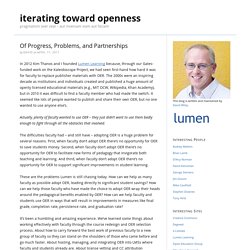
The 2000s were an inspiring decade as institutions and individuals created and published a huge amount of openly licensed educational materials (e.g., MIT OCW, Wikipedia, Khan Academy), but in 2010 it was difficult to find a faculty member who had made the switch. It seemed like lots of people wanted to publish and share their own OER, but no one wanted to use anyone else’s. Actually, plenty of faculty wanted to use OER – they just didn’t want to use them badly enough to fight through all the obstacles that involved. The difficulties faculty had – and still have – adopting OER is a huge problem for several reasons. First, when faculty don’t adopt OER there’s no opportunity for OER to save students money.
These are the problems Lumen is still chasing today. The Evolving Economics of Educational Materials and Open Educational Resources: Toward Closer Alignment with the Core Values of Education. Last year Bob Reiser invited me to contribute a chapter to the fourth edition of Trends and Issues in Instructional Design and Technology, to be published by Pearson.
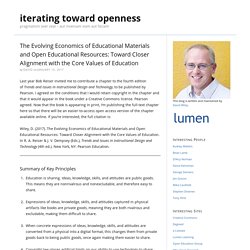
I agreed on the conditions that I would retain copyright in the chapter and that it would appear in the book under a Creative Commons license. Pearson agreed. The Open Flip. At the start of the digital, networked revolution there were lots of books about new business models.
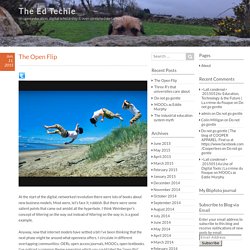
Most were, let’s face it, rubbish. But there were some salient points that came out amidst all the hyperbole. I think Weinberger’s concept of filtering on the way out instead of filtering on the way in, is a good example. Anyway, now that internet models have settled a bit I’ve been thinking that the next phase might be around what openness offers. I circulate in different overlapping communities: OERs, open access journals, MOOCs, open textbooks. Cable Green, speaking of open textbooks, says we have lots of money in education, we’re just really bad at spending it. There are other areas where this might be applicable too, beyond education. The digital, networked infrastructure is the substratum that allows this to happen, but it is open licensing that adds the final ingredient.
Qualitymodels. New ICDE report on ways to improve student success in open, distance and e-learning programmes. The Open Data Handbook. Reading Material. „Open Lesson”: Do-It-Yourself workshop on Open Education. In Poland, training and education is an important part of our work on promoting open, and a necessary support for our policy work.
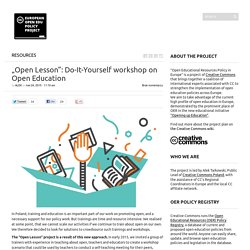
But trainings are time and resource intensive. We realised at some point, that we cannot scale our activities if we continue to train about open on our own. We therefore decided to look for solutions to crowdsource such trainings and workshops. The “Open Lesson” project is a result of this new approach. Oer15: Window Boxes, Battles, and Bandwagons. So OER15, with its theme of ‘Mainstreaming Open Education’, introduced a bit of a quandary.
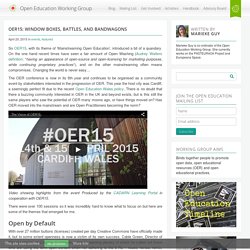
On the one hand recent times have seen a fair amount of Open Washing (Audrey Watters definition: “having an appearance of open-source and open-licensing for marketing purposes, while continuing proprietary practices“), and on the other mainstreaming often means compromises. Changing the world is never easy… The OER conference is now in its 6th year and continues to be organised as a community event by stakeholders interested in the progression of OER. This year the host city was Cardiff, a seemingly perfect fit due to the recent Open Education Wales policy. There is no doubt that there a buzzing community interested in OER in the UK and beyond exists, but is this still the same players who saw the potential of OER many moons ago, or have things moved on?
Video showing highlights from the event Produced by the CADARN Learning Portal in cooperation with OER15. An Error Occurred Setting Your User Cookie. An Error Occurred Setting Your User Cookie. We Are All Open Educational Resources. OER15 Hodgkinson Williams. OER World Map. Crowdsourcing Quality (Or, Why Openness Matters) By Javiera Atenas (University College London) & Leo Havemann (Birkbeck, University of London) Quality in open contexts In a trajectory that did not simply begin from MIT OpenCourseWare (OCW), via Open Educational Resources (OER), and latterly arrive at a promised land of Massive Open Online Courses (MOOCs), a plethora of institutions, organisations and individuals have attempted through various and numerous interventions to ‘open up’ the education landscape to a wider range of travellers, inhabitants and tourists.
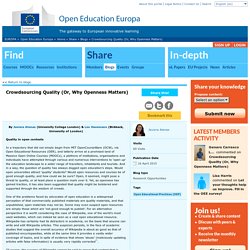
And in a way, the question of quality has always dogged open education’s steps. Would open universities attract ‘quality’ students? Welcome to XtLearn. Help for Safari Can't see the bookmarks bar?
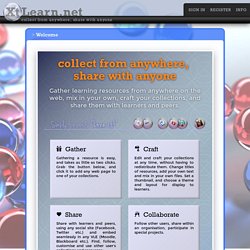
Just click the View menu, and choose View Bookmarks Bar. Drag and drop the button onto the bookmarks bar You'll then be asked to name it - choose anything you like, such as "Add to XtLearn" or simply "XtAdd". Help for Internet Explorer 17 Make sure you can see your Links bar: click the View menu, then Toolbars and make sure Links is ticked. Help for Internet Explorer 9 Make sure you can see your Favourites bar: right-click a blank bit of the top of the window and make sure Favorites bar is ticked. 85471.pdf. European Commission - Survey of digital educati... OER Strategy Document. Designing for Educational Technology to Enhance the Experience of Learners in Distance Education: How Open Educational Resources, Learning Design and Moocs Are Influencing Learning. Designing for Educational Technology to Enhance the Experience of Learners in Distance Education: How Open Educational Resources, Learning Design and Moocs Are Influencing Learning Eileen Scanlon, Patrick McAndrew, Tim O'Shea Abstract The area of learning has a justifiable claim to be a special case in how it can be enhanced or supported by technology.
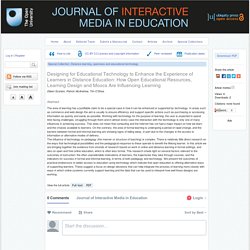
Ds4oer.oeru. Open educational resources and the higher education environment. A leadership opportunity for libraries Two speakers from the SPARC-ACRL Forum at the 2015 ALA Midwinter Meeting, Kristi Jensen and Quill West, have graciously agreed to share their insights into open educational resources (OER) in this month’s column.
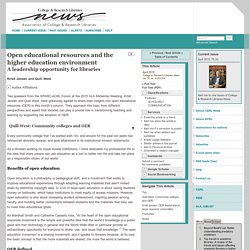
They approach this topic from different perspectives and assert that libraries can play a pivotal role in transforming teaching and learning by supporting the adoption of OER. Quill West: Community colleges and OER Every community college that I’ve worked with, for, and around for the past ten years has referenced diversity, access, and goal attainment in its institutional mission statements. As a librarian working for equal access institutions, I have dedicated my professional life to the idea that every person can use education as a tool to better her life and take her place as a responsible citizen of our world. CC_Guidelines_092014TS. Fifty Shades of Open Education. The Education in the Digital Era conference & ongoing online discussion (in Twitter #EdDigEra and in Facebook group) has identified Open Education as one key practice that has the potential to help involved actors in all levels achieve combined three strategic aims: Enhance the quality of educationEmpower both educators & learnersImprove access equality to education.
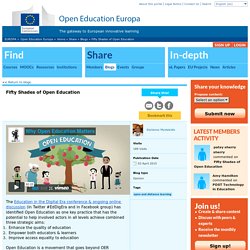
LangOER blog created by European Schoolnet. Open Educational Resources (OER) are a growing area of interest internationally. More and more teachers and school leaders use free educational materials to be shared and reused for teaching, learning, and other purposes. How can Open Educational Resources enrich your teaching and learning practice? Can they spice up your classes? Where to find OER in your language? Are you curious about how to blend online learning in your own teaching context? Interactive Open Educational Resources: A Guide to Finding, Choosing, and Using What's Out There to Transform College Teaching - John D. Shank. Recent faculty surveys show that some of the most difficult challenges instructors face when teaching are motivating and engaging their students, while making connections to critical course content.
And today’s students are “digital natives”—a generation who like to be able to watch, listen, read, and interact with their technology-rich environment. Consequently, interactive learning resources in various formats (including multimedia tutorials, modules, games, and simulations) are rapidly becoming vital learning resources for faculty and students to enhance both classroom and online learning.